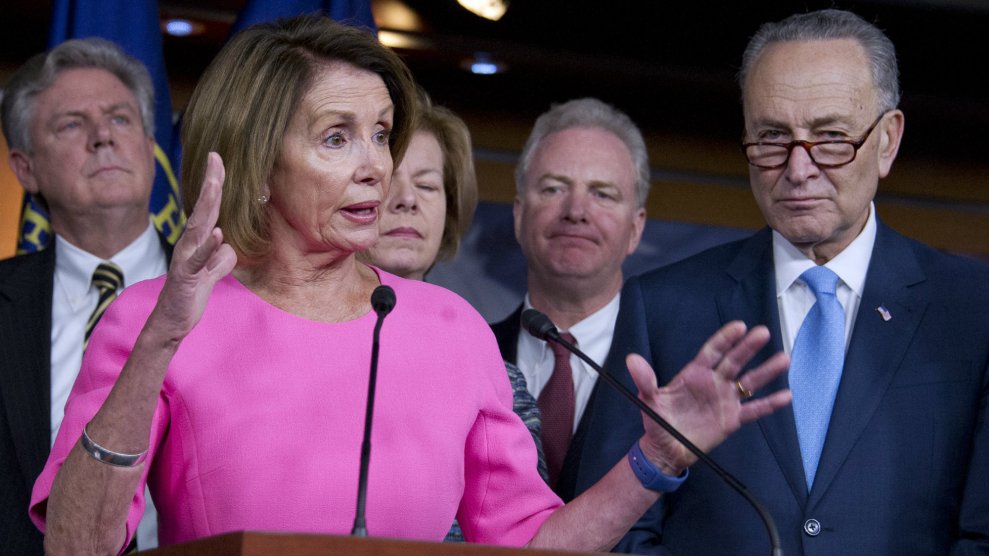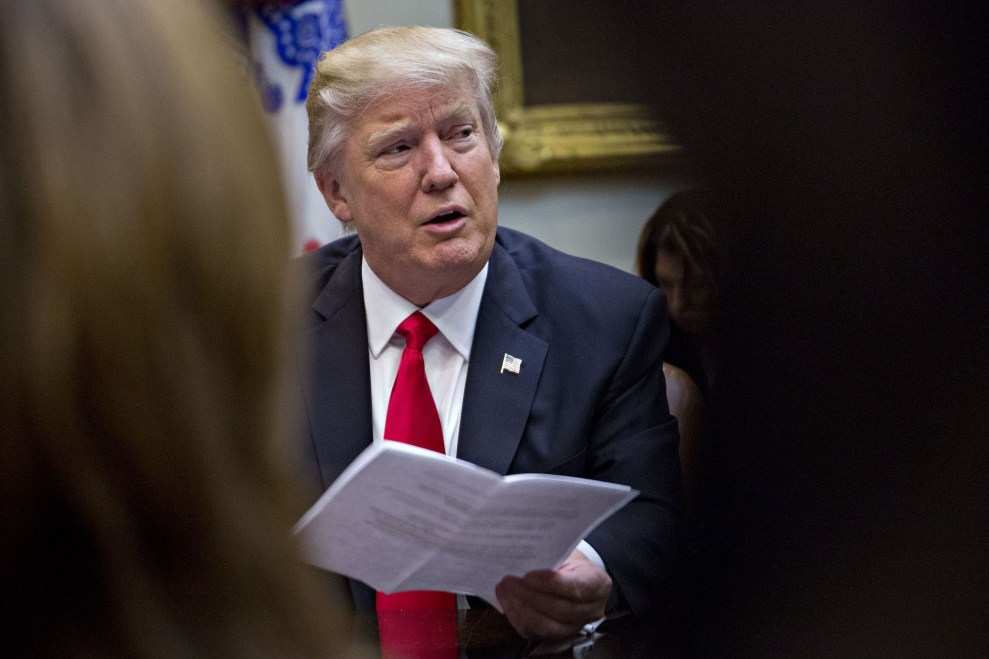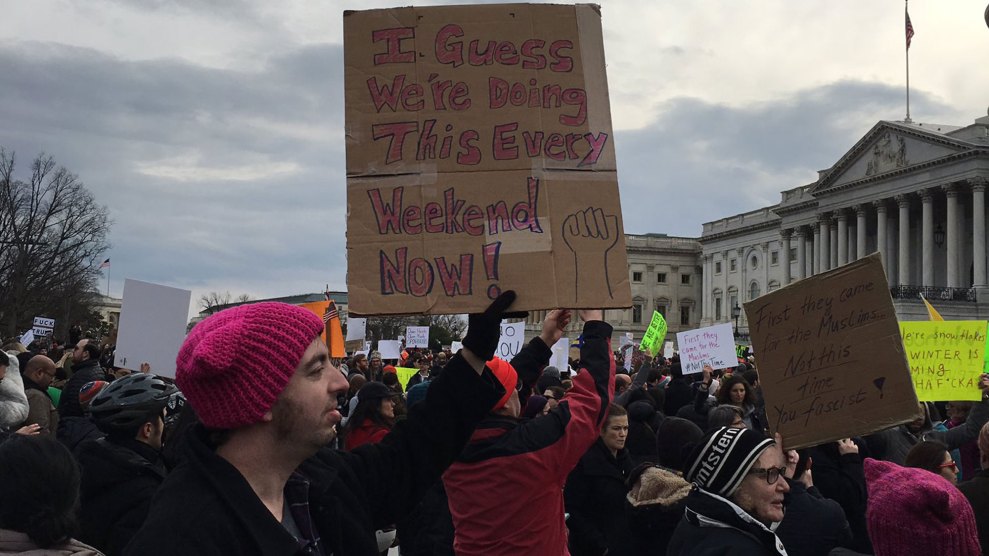
Ron Sachs/CNP via ZUMA Wire
This weekend, some prominent Democrats took to the barricades to protest President Donald Trump’s executive order temporarily banning immigrants from certain Muslim-majority nations and limiting refugees. Sen. Elizabeth Warren of Massachusetts rushed to Logan International Airport to join the spontaneous protest there. Sen. Cory Booker of New Jersey headed to Dulles International Airport outside Washington to decry the order as essentially a Muslim ban. Other Ds slammed Trump’s move and praised the federal court order that temporarily froze part of the presidential order. It was a show of force. And it prompted a question: Was this a step toward a wider and deeper opposition to Trump?
Until now, the response from elected Democratic officials to the Trump takeover of the federal government has left some grassroots Dems underwhelmed and puzzled. The weekend of the inauguration, millions of Americans hit the streets to denounce Trump, his dystopic and divisive view of America, and his policies (especially those regarding women). The overarching message was fundamental: resist. Yet few national Democrats have mirrored back this sentiment to the progressive audience and to millions of Americans who voted for Hillary Clinton and have spent the last few months in a state of discouragement, fear, and anger.
Sure, Capitol Hill Democrats have spoken against Trump and his fellow Republicans’ first stab at repealing Obamacare and have called out the early GOP talk of privatizing Medicare. Booker did break with senatorial courtesy to testify against the nomination of Sen. Jeff Sessions (R-Ala.), Trump’s choice to be attorney general. Yet at the same time, several key Democrats—most notably Senate Democratic leader Chuck Schumer—talked of working with Trump on areas of common ground, say infrastructure spending. Sen. Bernie Sanders, the progressive firebrand, said he would be “delighted” to collaborate with Trump on trade policy. And most Senate Democrats have been voting for Trump’s Cabinet nominees. Warren and Sen. Sherrod Brown (D-Ohio), another leading progressive, voted in the banking committee for Ben Carson, Trump’s hardly qualified pick to head the Department of Housing and Urban Development. Booker and 46 other Democratic senators voted for retired General James Mattis, Trump’s choice for defense secretary. (Sen. Kirsten Gillibrand of New York has so far voted against every nominee except UN Ambassador Nikki Haley.)
The Senate Democrats have indicated they will mount campaigns against certain Trump nominees, notably Betsy DeVos, the education secretary nominee, and perhaps Rep. Tom Price (R-Ga.), Trump’s eager-to-repeal-Obamacare pick to head the Department of Health and Human Services. But their response so far has created the impression of piecemeal opposition. There has been no big thematic push against Trump. The concerns and outrage of the 66 million Americans who had voted for Clinton are not being directly addressed. Rep. John Lewis (D-Ga.) did mobilize a modest-sized boycott of Trump’s inauguration after saying Trump was not a “legitimate” president. But in general, the Democratic leadership was not sharing the sense that a crisis is underway.
And the first week of the Trump era did suggest that a crisis was at hand. Consider the following:
* In his initial days in the White House, Trump behaved in an erratic manner and gave reason to suspect he was prone to delusions. He repeatedly insisted that the crowd at his inauguration was record-setting. Despite all evidence to the contrary, he claimed that up to 1.5 million people were there and that his ceremony had topped the turnout at President Barack Obama’s first inauguration. He pressed the National Park Service to back him up. He ordered White House Press Secretary Sean Spicer to push this lie in public. During an event at the wall in CIA headquarters that commemorates agency officers who have lost their lives, Trump prattled on about the crowd size and claimed he had been on the cover of Time magazine more than football star Tom Brady or anyone else. (Wrong: Richard Nixon still holds that record.) The president of the United States was coming across as a fellow with a solid case of narcissistic personality disorder, as senior adviser Kellyanne Conway tried to explain that he and his crew were merely citing “alternative facts.” Days later, Trump bolstered the impression that he was untethered from reality when he claimed—first in private to members of Congress and then publicly during an interview—that 3 million to 5 million undocumented people had voted illegally in the presidential election. There was no evidence for this assertion. Still, Trump absurdly and stubbornly maintained that a study backed him up, though the author of this work had declared it did not confirm Trump’s point. It turned out that Trump was probably basing his claim on a tweet from a guy with no expertise that had been promoted by Infowars, the conspiracy theory site of 9/11 truther Alex Jones. The fellow now in charge of the US nuclear arsenal was acting bizarrely.
* One of Trump’s first actions was an executive order aimed at undermining the Affordable Care Act. He essentially instructed federal agencies to do what they can to weaken the program, while congressional Republicans vowed to make good on their obsession to smite Obamacare. The Rs faced the obvious problem of deriving a replacement that would preserve the most popular aspects of the program—and it may be impossible for them to do so. (If you don’t compel people, including young adults and the healthy, to buy insurance and enlarge the pool of insured, you cannot mandate insurers to cover preexisting conditions.) Still, the intent remained: Trump was aiming to blow up a program that provides 27 million or so Americans with health insurance. Ripping insurance from all these people posed a grave threat to a large percentage of the country.
* A promoter of white nationalists participating in the most sensitive and secretive meetings held in the White House—that’s essentially what Trump brought about when he signed an executive order that allowed Steve Bannon, a senior White House aide who is Trump’s top political strategist, to sit in on the principals committee of the National Security Council. Bannon has acknowledged that as the publisher of Breitbart he positioned this conservative website as a “platform” for the alt-right, a wing of the conservative movement that prominently features white nationalists. Not only is Bannon a champion of white nationalists; he’s a self-proclaimed proponent of political destruction. In November 2013, he declared in an interview, “I’m a Leninist.” And he explained, “Lenin wanted to destroy the state, and that’s my goal too. I want to bring everything crashing down, and destroy all of today’s establishment.” In a 2014 private talk he noted he believes the world is now experiencing a clash of civilizations: “We’re at the very beginning stages of a very brutal and bloody conflict, of which if the people in this room, the people in the church, do not bind together and really form what I feel is an aspect of the church militant, to really be able to not just stand with our beliefs, but to fight for our beliefs against this new barbarity that’s starting, that will completely eradicate everything that we’ve been bequeathed over the last 2,000, 2,500 years.” Placing a political adviser with extreme views in such important meetings—previous presidents have kept their political aides out of these sessions—is a clear and present danger.
* Shortly before Trump took office, the US intelligence community issued a stark conclusion regarding Russia’s meddling in the 2016 election: Vladimir Putin had ordered a comprehensive and covert Russian intelligence operation to subvert US democracy to assist Trump. Is there a more serious matter than the integrity of US elections? For months, Trump would not accept intelligence community assessments blaming Russia for the hacking of Democratic targets and the leaking of material to harm Clinton’s campaign. He eventually and reluctantly acknowledged this conclusion—but he downplayed it, and he has not said what he intends to do in response. On Saturday, Trump had his first phone call with Putin, and the reports of the conversation suggested he did not confront Putin about Russia’s interference in US elections. This was a serious abdication of presidential responsibility and a sign that he is not willing to defend the Constitution.
So during his first week in office, Trump triggered a constitutional crisis with his immigration order (as Customs and Border Protection agents refused to abide by a federal court’s temporary stay) and adopted a policy that national security experts noted would impede the country’s counterterrorism efforts, held a comfy conversation with a man who undermined US elections, started the process to deny millions of Americans health care, placed a fan of white nationalists in the middle of the most important national security discussions, and demonstrated that he literally cannot handle the truth. This is not business as usual. And Democrats and progressives beyond the Beltway are not wrong to wonder if the reaction from top Democrats has not been commensurate with Trump’s actions.
It may be that the Democratic Party lacks leaders in a position to rally fundamental opposition to Trump. Schumer is an insider legislator. House Democratic leader Nancy Pelosi is no rabble-rouser. There are no obvious 2020 candidates yet. Barack Obama and Joe Biden appeared to have taken a time-out. Yet the protests of the past two weekends show that there is an energized and mobilized anti-Trump movement, and most of its adherents are likely looking for Democrats to take a strong and robust stand against Trump. Perhaps the nationwide demonstrations against Trump will spur more Democratic opposition on Capitol Hill. After all, can Senate Democrats still vote for Sessions out of senatorial courtesy, when Trump has declared war on the values and programs they hold dear?
In the past days, Trump has sent a clear signal: He will disrupt, he will attack, he will not work cooperatively, he will not be burdened by facts or expertise. Democrats might have initially hoped to devise a strategy of selective opposition. But sometimes you cannot choose the fight you are in. Nuance is not always an option. In a Washington Post op-ed, Adam Jentleson, the former deputy chief of staff for Sen. Harry Reid, who just retired from the Senate, counseled Democrats to forge a wide-ranging front against Trump. He noted how this could be done: “Senate Democrats have a powerful tool at their disposal, if they choose to use it, for resisting a president who has no mandate and cannot claim to embody the popular will. That tool lies in the simple but fitting act of withholding consent. An organized effort to do so on the Senate floor can bring the body to its knees and block or severely slow down the agenda of a president who does not represent the majority of Americans.”
Schumer has not yet embraced such a strategy of resistance. But Senate Dems said on Monday that they will wage a filibuster to block Trump’s Supreme Court nominee. And Schumer announced that he would oppose five Trump nominations: Price, Rep. Mick Mulvaney (R-S.C.) for budget director, Steve Mnuchin for treasury secretary, Scott Pruitt for Environmental Protection Agency chief, and Andy Puzder for labor secretary. Meanwhile, Obama released a mildly worded statement praising this weekend’s demonstrations and criticizing policies that “discriminate against individuals because of their faith or religion.”
Millions of Americans do not share Trump’s dark ideas and do not accept his bigotry and misogyny. They represent a majority of the electorate, and they are ready and eager to confront Trumpism. If the Democratic Party is serious about reversing its fortunes, it must harness this energy. That means presenting an opposition that resonates with these voters. At the start of Week Two of the Trump Era, there were indications the Democrats were moving toward a more comprehensive opposition, perhaps wielding the tools of obstructionism that Republicans used to thwart President Barack Obama’s agenda. With Trump already on the rampage, they may not have much choice.








